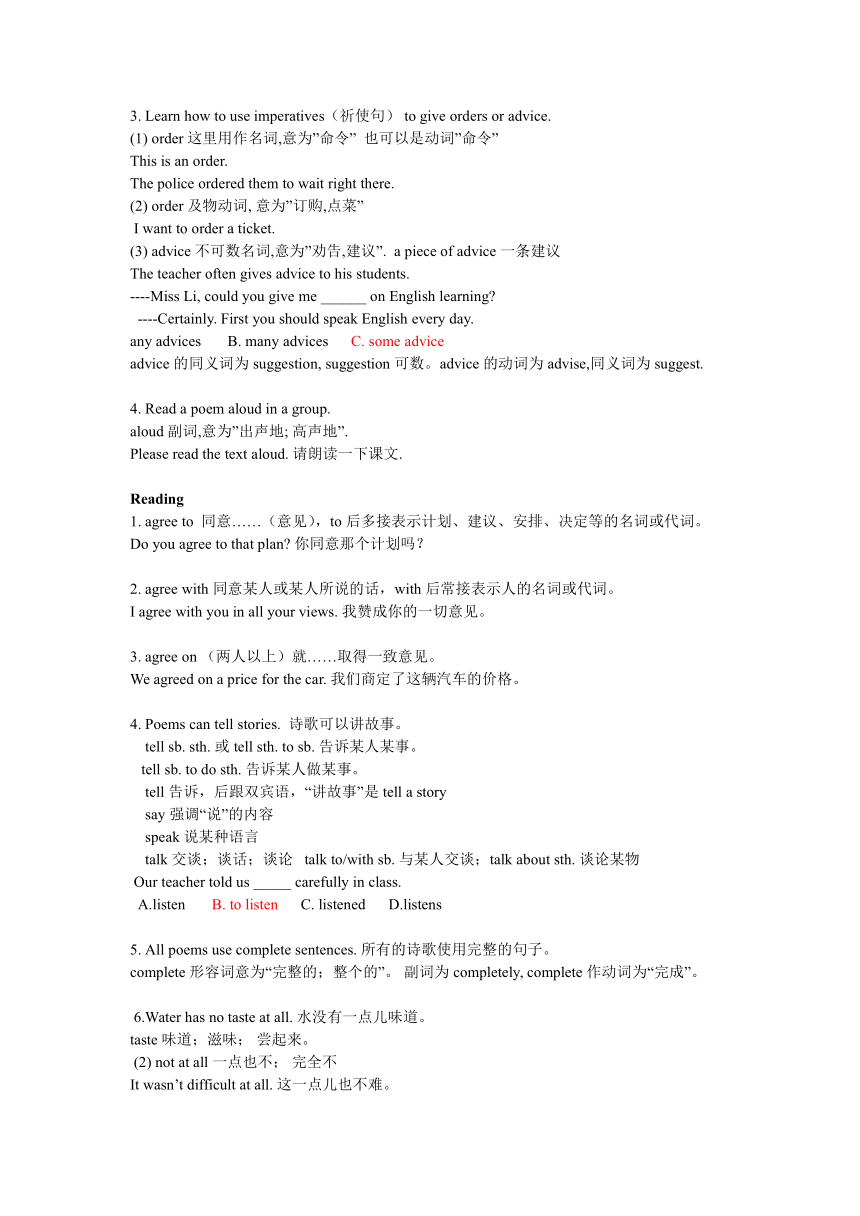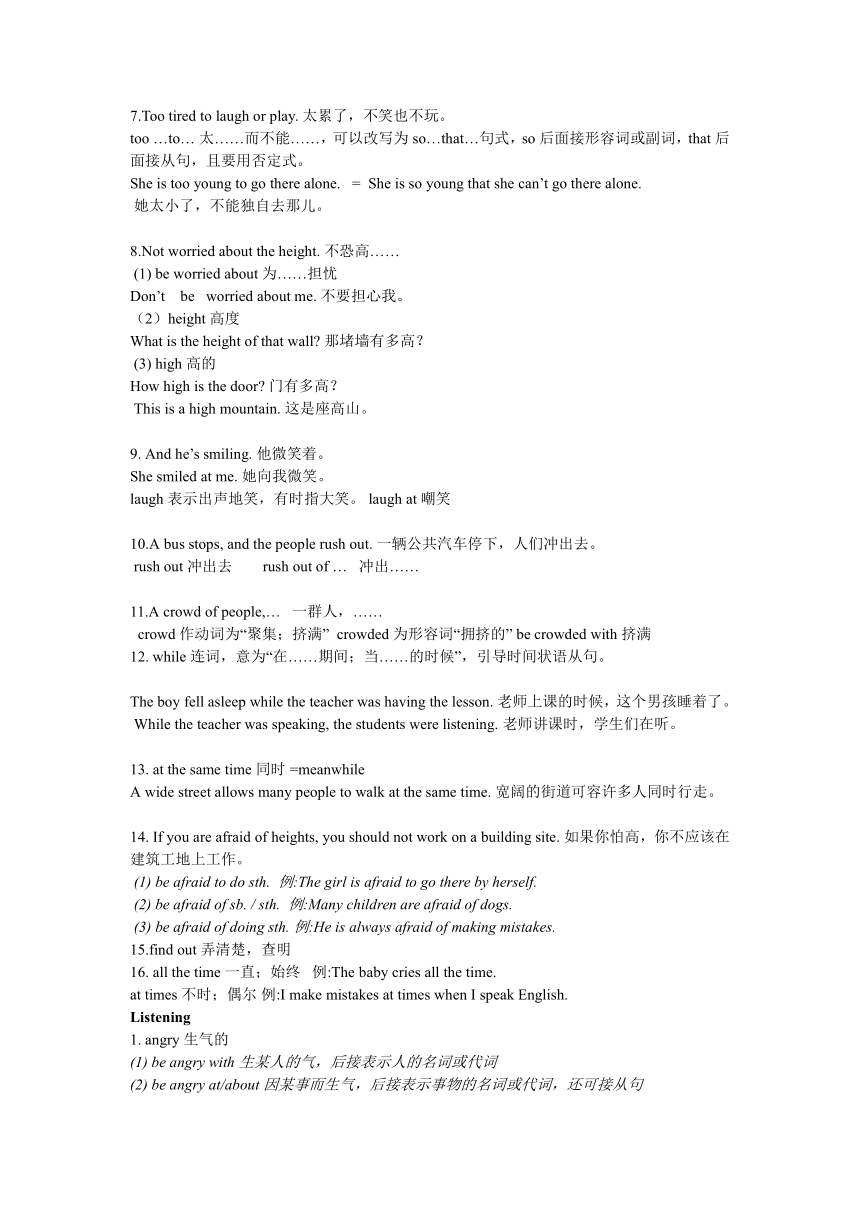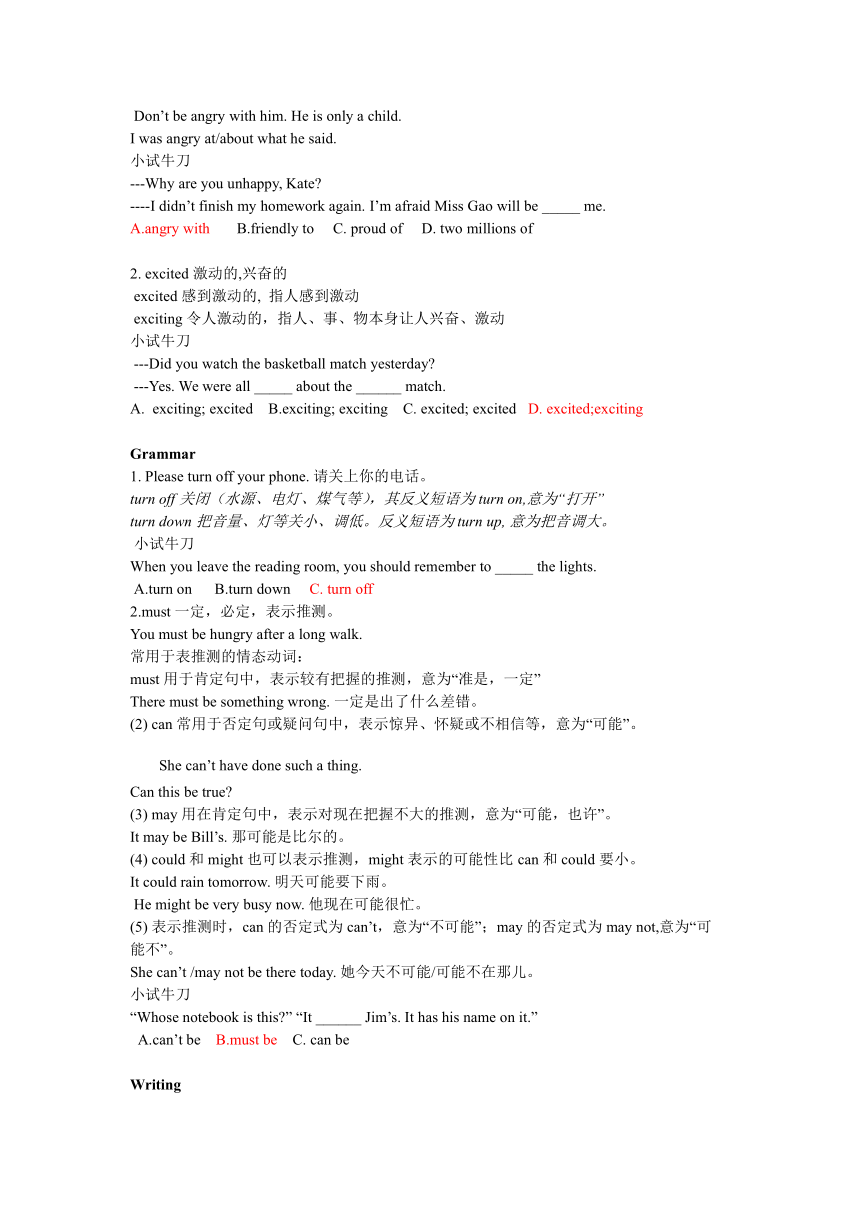Unit 7 Poems 单元导学案(有答案)
文档属性
| 名称 | Unit 7 Poems 单元导学案(有答案) |  | |
| 格式 | docx | ||
| 文件大小 | 27.1KB | ||
| 资源类型 | 教案 | ||
| 版本资源 | 牛津深圳版 | ||
| 科目 | 英语 | ||
| 更新时间 | 2021-05-20 08:36:16 | ||
图片预览




文档简介
牛津深圳版七年级下册Unit 7 Poems导学案
Language Points
一、词组归纳
1. (not) at all 一点也(不),完全(不)
2. (be ) worried about 为……担忧
3. newspaper stand 报摊
4. rush out 冲出去
5. a crowd of 一群
6. with tired faces 带着倦容
7. hurry to work 匆忙去工作
8. change one’s idea (about sth) 改变(对某事的)看法
9. give sb advice 给某人建议
10.take sb’s advice 接受某人建议
11.find out 找出,查明
12.high up in the cloud 高入云层
13.a piece of wood 一块木头
14.all the time 一直
15.in class 在课堂上
16.on a windy day 在一个刮风的一天
17.in a low voice 用低沉的声音
18.leave the door open 让门开着
19.on my way 在我的路上
20 come up 接近,发生
21.follow the rules 遵守规则
22.clean up 打扫
23.knock on the door 敲门
24.from dawn to dusk 从黎明到黄昏,从早到晚
25.keep our city green 保持我们的城市绿色
26.look like 看起来像
27.think of. 认为,想起
二、课文讲解
Getting?ready?
1.?Read?two?poems?about?ordinary?people.?
ordinary?普通的;平凡的?=common=usual
out?of?the?ordinary?不平常;非凡?
poem诗歌,可数。poetry诗歌的统称,poet诗人。
2.?Listen?to?four?short?poems?about?feelings.?
(1)feel?连系动词意为”感到,感觉”?
I?feel?very?tired?today.
(2)feel及物动词,意为”感觉,触摸”.?
I?felt?the?house?shake?yesterday.??
3.?Learn?how?to?use?imperatives(祈使句)?to?give?orders?or?advice.?
(1)?order?这里用作名词,意为”命令”??也可以是动词”命令”?
This?is?an?order.?
The?police?ordered?them?to?wait?right?there.?
(2)?order?及物动词,?意为”订购,点菜”
?I?want?to?order?a?ticket.?
(3)?advice?不可数名词,意为”劝告,建议”.??a?piece?of?advice?一条建议?
The?teacher?often?gives?advice?to?his?students.?
----Miss?Li,?could?you?give?me?______?on?English?learning?
??----Certainly.?First?you?should?speak?English?every?day.??
any?advices???????B.?many?advices??????C.?some?advice??
advice的同义词为suggestion, suggestion可数。advice的动词为advise,同义词为suggest.
4.?Read?a?poem?aloud?in?a?group.???
aloud?副词,意为”出声地;?高声地”.??
Please?read?the?text?aloud.?请朗读一下课文.????
Reading??
1.?agree?to??同意……(意见),to后多接表示计划、建议、安排、决定等的名词或代词。?
Do?you?agree?to?that?plan??你同意那个计划吗??
2.?agree?with?同意某人或某人所说的话,with?后常接表示人的名词或代词。?
I?agree?with?you?in?all?your?views.?我赞成你的一切意见。
3.?agree?on?(两人以上)就……取得一致意见。?
We?agreed?on?a?price?for?the?car.?我们商定了这辆汽车的价格。
4.?Poems?can?tell?stories.??诗歌可以讲故事。?
tell?sb.?sth.?或?tell?sth.?to?sb.?告诉某人某事。
? tell?sb.?to?do?sth.?告诉某人做某事。?
tell?告诉,后跟双宾语,“讲故事”是tell?a?story??
say?强调“说”的内容?
speak?说某种语言?
talk?交谈;谈话;谈论???talk?to/with?sb.?与某人交谈;talk?about?sth.?谈论某物?
?Our?teacher?told?us?_____?carefully?in?class.??
listen???????B.?to?listen??????C.?listened??????D.listens?
5.?All?poems?use?complete?sentences.?所有的诗歌使用完整的句子。
complete?形容词意为“完整的;整个的”。?副词为completely, complete作动词为“完成”。
?6.Water?has?no?taste?at?all.?水没有一点儿味道。
taste?味道;滋味;?尝起来。
?(2)?not?at?all?一点也不;?完全不?
It?wasn’t?difficult?at?all.?这一点儿也不难。?
7.Too?tired?to?laugh?or?play.?太累了,不笑也不玩。?
too?…to…?太……而不能……,可以改写为so…that…句式,so后面接形容词或副词,that?后面接从句,且要用否定式。?
She?is?too?young?to?go?there?alone.???=??She?is?so?young?that?she?can’t?go?there?alone.?
?她太小了,不能独自去那儿。?
8.Not?worried?about?the?height.?不恐高……
?(1)?be?worried?about?为……担忧?
Don’t be ?worried?about?me.?不要担心我。?
(2)height?高度?
What?is?the?height?of?that?wall??那堵墙有多高?
?(3)?high?高的?
How?high?is?the?door??门有多高?
?This?is?a?high?mountain.?这是座高山。?
9.?And?he’s?smiling.?他微笑着。?
She?smiled?at?me.?她向我微笑。?
laugh表示出声地笑,有时指大笑。?laugh?at?嘲笑?
10.A?bus?stops,?and?the?people?rush?out.?一辆公共汽车停下,人们冲出去。
?rush?out?冲出去????????rush?out?of?…???冲出……
11.A?crowd?of?people,…???一群人,……
??crowd?作动词为“聚集;挤满”??crowded为形容词“拥挤的”?be?crowded?with?挤满?
while?连词,意为“在……期间;当……的时候”,引导时间状语从句。?
The?boy?fell?asleep?while?the?teacher?was?having?the?lesson.?老师上课的时候,这个男孩睡着了。
?While?the?teacher?was?speaking,?the?students?were?listening.?老师讲课时,学生们在听。
13.?at?the?same?time?同时?=meanwhile
A?wide?street?allows?many?people?to?walk?at?the?same?time.?宽阔的街道可容许多人同时行走。
14.?If?you?are?afraid?of?heights,?you?should?not?work?on?a?building?site.?如果你怕高,你不应该在
建筑工地上工作。
?(1)?be?afraid?to?do?sth.??例:The?girl?is?afraid?to?go?there?by?herself.
?(2)?be?afraid?of?sb.?/?sth.??例:Many?children?are?afraid?of?dogs.
?(3)?be?afraid?of?doing?sth.?例:He?is?always?afraid?of?making?mistakes.?
15.find?out?弄清楚,查明?
16.?all?the?time?一直;始终? 例:The?baby?cries?all?the?time.?
at?times?不时;偶尔?例:I?make?mistakes?at?times?when?I?speak?English.
Listening
1.?angry?生气的?
(1)?be?angry?with?生某人的气,后接表示人的名词或代词?
(2)?be?angry?at/about?因某事而生气,后接表示事物的名词或代词,还可接从句
?Don’t?be?angry?with?him.?He?is?only?a?child.?
I?was?angry?at/about?what?he?said.??
小试牛刀
---Why?are?you?unhappy,?Kate??
----I?didn’t?finish?my?homework?again.?I’m?afraid?Miss?Gao?will?be?_____?me.?
A.angry?with???????B.friendly?to?????C.?proud?of?????D.?two?millions?of?
2.?excited?激动的,兴奋的?
?excited?感到激动的, 指人感到激动?
?exciting?令人激动的,指人、事、物本身让人兴奋、激动
小试牛刀
?---Did?you?watch?the?basketball?match?yesterday?
?---Yes.?We?were?all?_____?about?the?______?match.?
exciting;?excited????B.exciting;?exciting????C.?excited;?excited???D.?excited;exciting??
Grammar
1.?Please?turn?off?your?phone.?请关上你的电话。?
turn?off?关闭(水源、电灯、煤气等),其反义短语为turn?on,意为“打开”?
turn?down?把音量、灯等关小、调低。反义短语为turn?up,?意为把音调大。
?小试牛刀
When?you?leave?the?reading?room,?you?should?remember?to?_____?the?lights.?
?A.turn?on??????B.turn?down?????C.?turn?off??????
2.must?一定,必定,表示推测。
You?must?be?hungry?after?a?long?walk.??
常用于表推测的情态动词:?
must?用于肯定句中,表示较有把握的推测,意为“准是,一定”?
There?must?be?something?wrong.?一定是出了什么差错。?
(2)?can?常用于否定句或疑问句中,表示惊异、怀疑或不相信等,意为“可能”。?
She?can’t?have?done?such?a?thing.??
Can?this?be?true??
(3)?may?用在肯定句中,表示对现在把握不大的推测,意为“可能,也许”。?
It?may?be?Bill’s.?那可能是比尔的。?
(4)?could和might也可以表示推测,might表示的可能性比can和could?要小。?
It?could?rain?tomorrow.?明天可能要下雨。
?He?might?be?very?busy?now.?他现在可能很忙。?
(5)?表示推测时,can的否定式为can’t,意为“不可能”;may的否定式为may?not,意为“可
能不”。?
She?can’t?/may?not?be?there?today.?她今天不可能/可能不在那儿。?
小试牛刀
“Whose?notebook?is?this?”?“It?______?Jim’s.?It?has?his?name?on?it.”
can’t?be????B.must?be????C.?can?be??
Writing
1.?And?they?always?follow?the?rules.?他们总是遵规守纪.?
follow?动词,意为”遵循;跟从;听从”
?Follow?the?traffic?rules.?遵循交通规则。?
We?should?follow?his?advice.?我们应该听从他的建议。
?2.?Just?knock?on?the?door.?只要敲敲门。?
knock?on?意为“敲”,常用来表示“敲门、窗”等。也可用knock at
?Who?is?knocking?on?the?door??谁在敲门??
3.?I?clean?up?things?that?people?drop…?我把人们丢掉的东西打扫干净???
clean?up?清理,打扫?
小试牛刀
Your?bedroom?is?so?dirty.?Would?you?please?_______,?Peter?
A.set?it?up????B.put?it?on????C.?pick?it?up????D.?clean?it?up
语法精讲
一、祈使句(imperatives)
1.祈使句的定义及句式特征:
定义:祈使句是用来表示请求、命令、叮嘱、邀请、劝告或祝愿等的句子。它的特点是通常省略主语you, 以动词原形开头,末尾可用句号或感叹号。祈使句没有疑问句的形式,一般只有肯定和否定两种形式。
Go and wash your hands. (表命令)
Be quite, please. (Please be quiet.)(表请求)
Be kind to your sister.(表劝告)
Watch your steps.(表警告)
No parking. (表禁止)
2.肯定形式(动词原形开头)
1)“V”结构(动态句): 动词原形V.+其他.
例句:Open the door, please.
2) “B”结构(静态句): Be +形容词+其他.
例句:Be careful!
3)“Let”结构(使役句): Let sb. do sth. 表示一种建议.
例句:Let me help you .
3.否定形式(一般在动词上否定,也可以用否定副词(never)来表示)
1) “B”结构【Don’t be +其他成分(形容词、名词或介词短语)】
Don’t be careless! Never be late again next time!
【注意】:①在这种句型中,be不能省略 ②否定副词not不可置于be之后
“V”结构(Don’t +动词原形+其他)
Don’t believe him! Don’t worry! Never do it again!
Let结构有两种否定形式
a. Let+宾语+not+动词原形+其他
Let her not do that. Let’s not think about it. It’s only a waste of time.
b. Don’t+ let+宾语+动词原形+其他
Don’t let Jim do that. Don’t let us go, please.
4)在公共场合的提示语中,否定祈使句常用“No+名词 / V-ing形式”结构,表示“禁止做某事”。例如: NO PHOTOS! 禁止拍照! No parking!
【注意】:
1). 在表达请求或劝告时,有时为了表示委婉的语气,可以在句首或句末please,但是如果please加在句末,应用逗号将其与前面的部分隔开。
Sit down, please. Please look after the twins.
2). 在意思比较明显的情况下,可以把谓语动词省略。 This way, please.
3). 有时为了加强语气,可以在动词前使用do. Do be careful!一定要小心!
4). 有时为了强调对方,也可加上主语you,人名或everybody, anybody等不定代词。
You sweep the floor and I clean the window. Stand up, everybody.
5).有时为了明确向谁提出请求或发出命令,可加称呼语,但称呼语要与句子用逗号隔开。
Put the shirt on the bed, Jim.
4.祈使句的回答
祈使句的动作通常是表示将来发生的动作,所以回答祈使句时,一般用will或won’t。
在回答具有否定意义的祈使句时,要注意两点:
形式一致(即Yes与will保持一致;No与won’t保持一致)
意思相反(即Yes是 “不”的意思;No是 “是”的意思)。
在回答时,要注意分析上下文语境中所提供的条件。例如:
--- Don’t go out, please. It’s raining heavily outside. 请不要出去。外面雨下得很大。
---- Yes, I will. I have to meet my brother at the airport.不行,我得去机场接我弟弟。
5. 祈使句与陈述句的并列使用
祈使句后接陈述句时,须用连接词连接。如果祈使句与陈述句表示的是一种顺承关系时,要用并列连词and来连接;如果祈使句与陈述句存在一种否定条件关系时,要用并列连词or来连接。例如:
Leave it with me and I will see what I can do.把它留给我吧,我想想有没有办法。
Hurry up, or we’ll be late. 快点,否则我们要迟到了。
二、感叹句(exclamations)
(一)感叹句是表示喜怒哀乐等强烈感情的句子。感叹句句末通常用感叹号,读时一般用降调。
(二)感叹句的基本句型
【句型一】What + (a / an) + 形容词 + 名词 + 主语 + 谓语!
What a clever boy he is! (他是个)多么聪明的男孩啊!
【说明】 在感叹句中,What a / an 常用来修饰单数可数名词,若其前面的形容词为元音开头,则用 an。what 是用来修饰复数可数名词和不可数名词。但有些不可数名词,如 rain, surprise, breakfast, lunch 等,当前面有形容词修饰,使抽象名词具体化时,则要用 what a / an,如:
What an interesting story it is! (这是个)多么有趣的故事啊!
What fine weather it is! 多好的天气啊!
What beautiful flowers they are! (它们是)多么漂亮的花啊!
【句型二】How + 形容词 / 副词 + 主语 + 谓语!
How well you look! 你气色真好! How kind you are! 你心肠真好!
How beautifully you sing! 你唱得真好听! Strawberries! How nice! 草莓! 多好呀!
How clever the boy is! 这个男孩多么聪明啊! How fast he runs! 他跑得多么快啊!
【说明】how还可以修饰动词构成感叹句,但动词不提前。如:
How I want to be a doctor! 我多么想成为一名医生啊! How she dances! 她跳得多好啊!
感叹句型总结
How + 形容词 + a + 名词 + 其他成分!
How + 形容词或副词 + 其他成分!
What +名词 + 其他成分!
What + a + 形容词 +名词 +其他成分!
What + 形容词 +复数名词 +其他成分!
What + 形容词 +不可数名词 +其他成分!
请看以下例子:
①It’s an interesting film. 这是一部有趣的电影。
→What an interesting film it is! 这是一部多有趣的电影啊!
②It’s wonderful weather. 天气很好。
→What wonderful weather! 天气真好!
③He did the work carefully. 他做这工作很仔细。
→How carefully he did the work! 他做这工作多仔细啊!
④Time passed quickly. 时间过得很快。
→How quickly time passed! 时间过得真快
操练起来
一.根据英文解释写出单词
1. usual,common ________ 2.suggestion ________
3. whole ________ 4.get out quickly ________
5. a large group of ________ 6. not wide ________
7.be concerned about ________
二. 重点短语
1. 一点也不 ________ 2. 报摊________
3. 至少 ________ 4. 淋浴 ________
5. 害怕 ________ 6.匆忙去做 ________
三. 词性转换
1. ordinary(反义词)__________
2. feeling (动词)________
3. advice(动词) __________
4. agree(反义词) (名词) .
5. complete (副词) _______
6. height (形容词) _________ 7. seller (动词) __________
8. crowd (形容词) .
9.agree with sb. 同意某人的观点
agree to 同意建议
agree on 就某事达成一致
四、句型转换
1. Will you please read it again more slowly? (改为祈使句)
_____ _____ again more slowly, please.
2. If you don't listen to me, I'll go. (改为同义句)
_____ _____ me, or I’ll go.
3. The teachers often tell the students not to be careless. (改为祈使句)
_____ _____careless, please.
4. Please sit next to Nancy. (改为否定句)
_____ _____ next to Nancy.
5. How delicious the food is! (改为同义句)
_______ _______ food it is!
6. They are running fast. (改为感叹句)
_______ _______ they are running!
7. Her sister is a very lovely girl. (改为感叹句)
_______ _______ lovely girl her sister is!
_______ _______ her sister is!
8. I have read a very interesting book. (改为感叹句)
_______ _______ _______ book I have read!
9. Your dictionary is very useful. (改为感叹句)
_______ _______ your dictionary is!
10. The children are singing and dancing happily. (改为感叹句)
_______ _______ the children are singing and dancing!
Key:
根据英文解释写出单词
ordinary 2. advice 3. complete 4. rush out
5. a crowd of 6. narrow 7. be worried about
二. 重点短语
1.be worried about 2.newspaper stand 3.at least 4.take a shower
5.be afraid of 6.hurry to do
三. 词性转换
1.extraordinary 2.feel 3.advise 4.disagree,agreement
5.completely 6.high 7.sell 8.crowded
四、句型转换
1.Read it 2.Listen to 3.Don’t be 4.Don’t sit
5.what delicious 6.how fast 7.what a, how lovely
8.what an interesting 9.how useful 10.how happily
Language Points
一、词组归纳
1. (not) at all 一点也(不),完全(不)
2. (be ) worried about 为……担忧
3. newspaper stand 报摊
4. rush out 冲出去
5. a crowd of 一群
6. with tired faces 带着倦容
7. hurry to work 匆忙去工作
8. change one’s idea (about sth) 改变(对某事的)看法
9. give sb advice 给某人建议
10.take sb’s advice 接受某人建议
11.find out 找出,查明
12.high up in the cloud 高入云层
13.a piece of wood 一块木头
14.all the time 一直
15.in class 在课堂上
16.on a windy day 在一个刮风的一天
17.in a low voice 用低沉的声音
18.leave the door open 让门开着
19.on my way 在我的路上
20 come up 接近,发生
21.follow the rules 遵守规则
22.clean up 打扫
23.knock on the door 敲门
24.from dawn to dusk 从黎明到黄昏,从早到晚
25.keep our city green 保持我们的城市绿色
26.look like 看起来像
27.think of. 认为,想起
二、课文讲解
Getting?ready?
1.?Read?two?poems?about?ordinary?people.?
ordinary?普通的;平凡的?=common=usual
out?of?the?ordinary?不平常;非凡?
poem诗歌,可数。poetry诗歌的统称,poet诗人。
2.?Listen?to?four?short?poems?about?feelings.?
(1)feel?连系动词意为”感到,感觉”?
I?feel?very?tired?today.
(2)feel及物动词,意为”感觉,触摸”.?
I?felt?the?house?shake?yesterday.??
3.?Learn?how?to?use?imperatives(祈使句)?to?give?orders?or?advice.?
(1)?order?这里用作名词,意为”命令”??也可以是动词”命令”?
This?is?an?order.?
The?police?ordered?them?to?wait?right?there.?
(2)?order?及物动词,?意为”订购,点菜”
?I?want?to?order?a?ticket.?
(3)?advice?不可数名词,意为”劝告,建议”.??a?piece?of?advice?一条建议?
The?teacher?often?gives?advice?to?his?students.?
----Miss?Li,?could?you?give?me?______?on?English?learning?
??----Certainly.?First?you?should?speak?English?every?day.??
any?advices???????B.?many?advices??????C.?some?advice??
advice的同义词为suggestion, suggestion可数。advice的动词为advise,同义词为suggest.
4.?Read?a?poem?aloud?in?a?group.???
aloud?副词,意为”出声地;?高声地”.??
Please?read?the?text?aloud.?请朗读一下课文.????
Reading??
1.?agree?to??同意……(意见),to后多接表示计划、建议、安排、决定等的名词或代词。?
Do?you?agree?to?that?plan??你同意那个计划吗??
2.?agree?with?同意某人或某人所说的话,with?后常接表示人的名词或代词。?
I?agree?with?you?in?all?your?views.?我赞成你的一切意见。
3.?agree?on?(两人以上)就……取得一致意见。?
We?agreed?on?a?price?for?the?car.?我们商定了这辆汽车的价格。
4.?Poems?can?tell?stories.??诗歌可以讲故事。?
tell?sb.?sth.?或?tell?sth.?to?sb.?告诉某人某事。
? tell?sb.?to?do?sth.?告诉某人做某事。?
tell?告诉,后跟双宾语,“讲故事”是tell?a?story??
say?强调“说”的内容?
speak?说某种语言?
talk?交谈;谈话;谈论???talk?to/with?sb.?与某人交谈;talk?about?sth.?谈论某物?
?Our?teacher?told?us?_____?carefully?in?class.??
listen???????B.?to?listen??????C.?listened??????D.listens?
5.?All?poems?use?complete?sentences.?所有的诗歌使用完整的句子。
complete?形容词意为“完整的;整个的”。?副词为completely, complete作动词为“完成”。
?6.Water?has?no?taste?at?all.?水没有一点儿味道。
taste?味道;滋味;?尝起来。
?(2)?not?at?all?一点也不;?完全不?
It?wasn’t?difficult?at?all.?这一点儿也不难。?
7.Too?tired?to?laugh?or?play.?太累了,不笑也不玩。?
too?…to…?太……而不能……,可以改写为so…that…句式,so后面接形容词或副词,that?后面接从句,且要用否定式。?
She?is?too?young?to?go?there?alone.???=??She?is?so?young?that?she?can’t?go?there?alone.?
?她太小了,不能独自去那儿。?
8.Not?worried?about?the?height.?不恐高……
?(1)?be?worried?about?为……担忧?
Don’t be ?worried?about?me.?不要担心我。?
(2)height?高度?
What?is?the?height?of?that?wall??那堵墙有多高?
?(3)?high?高的?
How?high?is?the?door??门有多高?
?This?is?a?high?mountain.?这是座高山。?
9.?And?he’s?smiling.?他微笑着。?
She?smiled?at?me.?她向我微笑。?
laugh表示出声地笑,有时指大笑。?laugh?at?嘲笑?
10.A?bus?stops,?and?the?people?rush?out.?一辆公共汽车停下,人们冲出去。
?rush?out?冲出去????????rush?out?of?…???冲出……
11.A?crowd?of?people,…???一群人,……
??crowd?作动词为“聚集;挤满”??crowded为形容词“拥挤的”?be?crowded?with?挤满?
while?连词,意为“在……期间;当……的时候”,引导时间状语从句。?
The?boy?fell?asleep?while?the?teacher?was?having?the?lesson.?老师上课的时候,这个男孩睡着了。
?While?the?teacher?was?speaking,?the?students?were?listening.?老师讲课时,学生们在听。
13.?at?the?same?time?同时?=meanwhile
A?wide?street?allows?many?people?to?walk?at?the?same?time.?宽阔的街道可容许多人同时行走。
14.?If?you?are?afraid?of?heights,?you?should?not?work?on?a?building?site.?如果你怕高,你不应该在
建筑工地上工作。
?(1)?be?afraid?to?do?sth.??例:The?girl?is?afraid?to?go?there?by?herself.
?(2)?be?afraid?of?sb.?/?sth.??例:Many?children?are?afraid?of?dogs.
?(3)?be?afraid?of?doing?sth.?例:He?is?always?afraid?of?making?mistakes.?
15.find?out?弄清楚,查明?
16.?all?the?time?一直;始终? 例:The?baby?cries?all?the?time.?
at?times?不时;偶尔?例:I?make?mistakes?at?times?when?I?speak?English.
Listening
1.?angry?生气的?
(1)?be?angry?with?生某人的气,后接表示人的名词或代词?
(2)?be?angry?at/about?因某事而生气,后接表示事物的名词或代词,还可接从句
?Don’t?be?angry?with?him.?He?is?only?a?child.?
I?was?angry?at/about?what?he?said.??
小试牛刀
---Why?are?you?unhappy,?Kate??
----I?didn’t?finish?my?homework?again.?I’m?afraid?Miss?Gao?will?be?_____?me.?
A.angry?with???????B.friendly?to?????C.?proud?of?????D.?two?millions?of?
2.?excited?激动的,兴奋的?
?excited?感到激动的, 指人感到激动?
?exciting?令人激动的,指人、事、物本身让人兴奋、激动
小试牛刀
?---Did?you?watch?the?basketball?match?yesterday?
?---Yes.?We?were?all?_____?about?the?______?match.?
exciting;?excited????B.exciting;?exciting????C.?excited;?excited???D.?excited;exciting??
Grammar
1.?Please?turn?off?your?phone.?请关上你的电话。?
turn?off?关闭(水源、电灯、煤气等),其反义短语为turn?on,意为“打开”?
turn?down?把音量、灯等关小、调低。反义短语为turn?up,?意为把音调大。
?小试牛刀
When?you?leave?the?reading?room,?you?should?remember?to?_____?the?lights.?
?A.turn?on??????B.turn?down?????C.?turn?off??????
2.must?一定,必定,表示推测。
You?must?be?hungry?after?a?long?walk.??
常用于表推测的情态动词:?
must?用于肯定句中,表示较有把握的推测,意为“准是,一定”?
There?must?be?something?wrong.?一定是出了什么差错。?
(2)?can?常用于否定句或疑问句中,表示惊异、怀疑或不相信等,意为“可能”。?
She?can’t?have?done?such?a?thing.??
Can?this?be?true??
(3)?may?用在肯定句中,表示对现在把握不大的推测,意为“可能,也许”。?
It?may?be?Bill’s.?那可能是比尔的。?
(4)?could和might也可以表示推测,might表示的可能性比can和could?要小。?
It?could?rain?tomorrow.?明天可能要下雨。
?He?might?be?very?busy?now.?他现在可能很忙。?
(5)?表示推测时,can的否定式为can’t,意为“不可能”;may的否定式为may?not,意为“可
能不”。?
She?can’t?/may?not?be?there?today.?她今天不可能/可能不在那儿。?
小试牛刀
“Whose?notebook?is?this?”?“It?______?Jim’s.?It?has?his?name?on?it.”
can’t?be????B.must?be????C.?can?be??
Writing
1.?And?they?always?follow?the?rules.?他们总是遵规守纪.?
follow?动词,意为”遵循;跟从;听从”
?Follow?the?traffic?rules.?遵循交通规则。?
We?should?follow?his?advice.?我们应该听从他的建议。
?2.?Just?knock?on?the?door.?只要敲敲门。?
knock?on?意为“敲”,常用来表示“敲门、窗”等。也可用knock at
?Who?is?knocking?on?the?door??谁在敲门??
3.?I?clean?up?things?that?people?drop…?我把人们丢掉的东西打扫干净???
clean?up?清理,打扫?
小试牛刀
Your?bedroom?is?so?dirty.?Would?you?please?_______,?Peter?
A.set?it?up????B.put?it?on????C.?pick?it?up????D.?clean?it?up
语法精讲
一、祈使句(imperatives)
1.祈使句的定义及句式特征:
定义:祈使句是用来表示请求、命令、叮嘱、邀请、劝告或祝愿等的句子。它的特点是通常省略主语you, 以动词原形开头,末尾可用句号或感叹号。祈使句没有疑问句的形式,一般只有肯定和否定两种形式。
Go and wash your hands. (表命令)
Be quite, please. (Please be quiet.)(表请求)
Be kind to your sister.(表劝告)
Watch your steps.(表警告)
No parking. (表禁止)
2.肯定形式(动词原形开头)
1)“V”结构(动态句): 动词原形V.+其他.
例句:Open the door, please.
2) “B”结构(静态句): Be +形容词+其他.
例句:Be careful!
3)“Let”结构(使役句): Let sb. do sth. 表示一种建议.
例句:Let me help you .
3.否定形式(一般在动词上否定,也可以用否定副词(never)来表示)
1) “B”结构【Don’t be +其他成分(形容词、名词或介词短语)】
Don’t be careless! Never be late again next time!
【注意】:①在这种句型中,be不能省略 ②否定副词not不可置于be之后
“V”结构(Don’t +动词原形+其他)
Don’t believe him! Don’t worry! Never do it again!
Let结构有两种否定形式
a. Let+宾语+not+动词原形+其他
Let her not do that. Let’s not think about it. It’s only a waste of time.
b. Don’t+ let+宾语+动词原形+其他
Don’t let Jim do that. Don’t let us go, please.
4)在公共场合的提示语中,否定祈使句常用“No+名词 / V-ing形式”结构,表示“禁止做某事”。例如: NO PHOTOS! 禁止拍照! No parking!
【注意】:
1). 在表达请求或劝告时,有时为了表示委婉的语气,可以在句首或句末please,但是如果please加在句末,应用逗号将其与前面的部分隔开。
Sit down, please. Please look after the twins.
2). 在意思比较明显的情况下,可以把谓语动词省略。 This way, please.
3). 有时为了加强语气,可以在动词前使用do. Do be careful!一定要小心!
4). 有时为了强调对方,也可加上主语you,人名或everybody, anybody等不定代词。
You sweep the floor and I clean the window. Stand up, everybody.
5).有时为了明确向谁提出请求或发出命令,可加称呼语,但称呼语要与句子用逗号隔开。
Put the shirt on the bed, Jim.
4.祈使句的回答
祈使句的动作通常是表示将来发生的动作,所以回答祈使句时,一般用will或won’t。
在回答具有否定意义的祈使句时,要注意两点:
形式一致(即Yes与will保持一致;No与won’t保持一致)
意思相反(即Yes是 “不”的意思;No是 “是”的意思)。
在回答时,要注意分析上下文语境中所提供的条件。例如:
--- Don’t go out, please. It’s raining heavily outside. 请不要出去。外面雨下得很大。
---- Yes, I will. I have to meet my brother at the airport.不行,我得去机场接我弟弟。
5. 祈使句与陈述句的并列使用
祈使句后接陈述句时,须用连接词连接。如果祈使句与陈述句表示的是一种顺承关系时,要用并列连词and来连接;如果祈使句与陈述句存在一种否定条件关系时,要用并列连词or来连接。例如:
Leave it with me and I will see what I can do.把它留给我吧,我想想有没有办法。
Hurry up, or we’ll be late. 快点,否则我们要迟到了。
二、感叹句(exclamations)
(一)感叹句是表示喜怒哀乐等强烈感情的句子。感叹句句末通常用感叹号,读时一般用降调。
(二)感叹句的基本句型
【句型一】What + (a / an) + 形容词 + 名词 + 主语 + 谓语!
What a clever boy he is! (他是个)多么聪明的男孩啊!
【说明】 在感叹句中,What a / an 常用来修饰单数可数名词,若其前面的形容词为元音开头,则用 an。what 是用来修饰复数可数名词和不可数名词。但有些不可数名词,如 rain, surprise, breakfast, lunch 等,当前面有形容词修饰,使抽象名词具体化时,则要用 what a / an,如:
What an interesting story it is! (这是个)多么有趣的故事啊!
What fine weather it is! 多好的天气啊!
What beautiful flowers they are! (它们是)多么漂亮的花啊!
【句型二】How + 形容词 / 副词 + 主语 + 谓语!
How well you look! 你气色真好! How kind you are! 你心肠真好!
How beautifully you sing! 你唱得真好听! Strawberries! How nice! 草莓! 多好呀!
How clever the boy is! 这个男孩多么聪明啊! How fast he runs! 他跑得多么快啊!
【说明】how还可以修饰动词构成感叹句,但动词不提前。如:
How I want to be a doctor! 我多么想成为一名医生啊! How she dances! 她跳得多好啊!
感叹句型总结
How + 形容词 + a + 名词 + 其他成分!
How + 形容词或副词 + 其他成分!
What +名词 + 其他成分!
What + a + 形容词 +名词 +其他成分!
What + 形容词 +复数名词 +其他成分!
What + 形容词 +不可数名词 +其他成分!
请看以下例子:
①It’s an interesting film. 这是一部有趣的电影。
→What an interesting film it is! 这是一部多有趣的电影啊!
②It’s wonderful weather. 天气很好。
→What wonderful weather! 天气真好!
③He did the work carefully. 他做这工作很仔细。
→How carefully he did the work! 他做这工作多仔细啊!
④Time passed quickly. 时间过得很快。
→How quickly time passed! 时间过得真快
操练起来
一.根据英文解释写出单词
1. usual,common ________ 2.suggestion ________
3. whole ________ 4.get out quickly ________
5. a large group of ________ 6. not wide ________
7.be concerned about ________
二. 重点短语
1. 一点也不 ________ 2. 报摊________
3. 至少 ________ 4. 淋浴 ________
5. 害怕 ________ 6.匆忙去做 ________
三. 词性转换
1. ordinary(反义词)__________
2. feeling (动词)________
3. advice(动词) __________
4. agree(反义词) (名词) .
5. complete (副词) _______
6. height (形容词) _________ 7. seller (动词) __________
8. crowd (形容词) .
9.agree with sb. 同意某人的观点
agree to 同意建议
agree on 就某事达成一致
四、句型转换
1. Will you please read it again more slowly? (改为祈使句)
_____ _____ again more slowly, please.
2. If you don't listen to me, I'll go. (改为同义句)
_____ _____ me, or I’ll go.
3. The teachers often tell the students not to be careless. (改为祈使句)
_____ _____careless, please.
4. Please sit next to Nancy. (改为否定句)
_____ _____ next to Nancy.
5. How delicious the food is! (改为同义句)
_______ _______ food it is!
6. They are running fast. (改为感叹句)
_______ _______ they are running!
7. Her sister is a very lovely girl. (改为感叹句)
_______ _______ lovely girl her sister is!
_______ _______ her sister is!
8. I have read a very interesting book. (改为感叹句)
_______ _______ _______ book I have read!
9. Your dictionary is very useful. (改为感叹句)
_______ _______ your dictionary is!
10. The children are singing and dancing happily. (改为感叹句)
_______ _______ the children are singing and dancing!
Key:
根据英文解释写出单词
ordinary 2. advice 3. complete 4. rush out
5. a crowd of 6. narrow 7. be worried about
二. 重点短语
1.be worried about 2.newspaper stand 3.at least 4.take a shower
5.be afraid of 6.hurry to do
三. 词性转换
1.extraordinary 2.feel 3.advise 4.disagree,agreement
5.completely 6.high 7.sell 8.crowded
四、句型转换
1.Read it 2.Listen to 3.Don’t be 4.Don’t sit
5.what delicious 6.how fast 7.what a, how lovely
8.what an interesting 9.how useful 10.how happily
